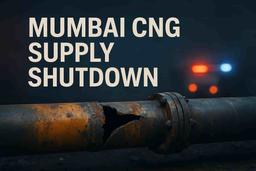Upcoming Corporate Average Fuel Efficiency (CAFÉ) norms are causing a major rift among Indian carmakers. While Maruti Suzuki, Toyota, Honda, and Renault support a weight-based definition for small cars, Tata Motors, Hyundai, and Mahindra & Mahindra oppose it, arguing that price should be the key factor. This debate has implications for market segmentation, compliance strategies, and vehicle safety standards as stricter emission targets loom.
India's automotive industry is divided ahead of the rollout of Corporate Average Fuel Efficiency (CAFÉ) 3 norms, effective April 1, 2027. These norms significantly tighten CO₂ emission targets to 88.4 gm/km.
The Bureau of Energy Efficiency (BEE) has proposed a draft that includes weight-based relaxations for small cars. A coalition including Maruti Suzuki, Toyota, Honda, and Renault, which collectively hold 49% of the passenger vehicle market, backs this approach.
However, rivals like Tata Motors, Hyundai, and Mahindra & Mahindra strongly oppose a purely weight-based definition. They argue it could distort the market and unfairly disadvantage manufacturers focused on affordability. A senior executive noted that some manufacturers propose using the car's price as a criterion for qualifying for these norms.
Shailesh Chandra, MD & CEO of Tata Motors Passenger Vehicles, criticized the weight-based proposal, stating it risks undermining safety standards. He pointed out that no car weighing under 909 kg currently meets the Bharat New Car Assessment Programme (BNCAP) safety rating, and promoting lighter vehicles could jeopardize decades of safety advancements. Tata Motors, with over 85% of its sales from small cars, believes there's no justification for such concessions.
The debate directly affects market leader Maruti Suzuki, which offers numerous models under 909 kg like the Wagon R, Celerio, Alto, and Ignis.
Currently, cars are classified for GST based on length and engine size. The upcoming CAFÉ 3 norms introduce a stricter CO₂ emission target (88.4 gm/km) compared to CAFÉ 2's 113 gm/km. Manufacturers failing to meet their fleet-average targets will face substantial penalties.
Impact:
This industry disagreement could lead to delayed finalization of norms, influence product development strategies, and impact the market share and profitability of manufacturers based on their compliance approaches. Investors may see varied impacts on different auto stocks depending on how they navigate these proposed regulations.
Rating: 7/10
Difficult Terms:
Corporate Average Fuel Efficiency (CAFÉ) norms: Regulations that set emission standards for vehicle fleets, aiming to improve fuel economy and reduce pollution. Manufacturers must meet an average CO₂ emission target across all their vehicles sold.
Bureau of Energy Efficiency (BEE): A statutory body under the Ministry of Power, Government of India, that develops programs for energy efficiency and conservation.
Society of Indian Automobile Manufacturers (SIAM): An apex industry body that represents all major automobile manufacturers in India.
Bharat New Car Assessment Programme (BNCAP): India's independent star rating system for car safety, similar to global NCAP programs.
CO₂ emission target: The maximum amount of carbon dioxide, a greenhouse gas, that vehicles are allowed to emit, measured in grams per kilometer (gm/km).
Fleet-average targets: The average emission standard that a manufacturer's entire range of vehicles sold in a year must meet.
GST: Goods and Services Tax, a consumption tax levied on the supply of goods and services.


